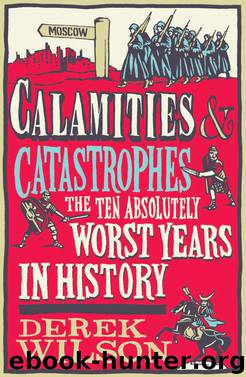Calamities and Catastrophes by Derek Wilson

Author:Derek Wilson [Derek Wilson]
Language: eng
Format: epub
ISBN: 9781780720166
Publisher: Short Books
Published: 2011-03-02T16:00:00+00:00
Many Poles, in 1848, were under Austrian or Prussian rule, but the greater part of their land had been incorporated into Russia. The people were suffering appallingly. Polish universities were closed and students obliged to study in St Petersburg, where they could be effectively brainwashed. As well as the activists deported to Siberia, over 6,000 had become voluntary exiles, most of them living in France, from where they plotted and schemed for the liberation of their country. Nationalists hoped that, as part of the movement towards self-determination that was blossoming in several parts of the continent, they would be helped to throw off the shackles of Russian domination. They naturally looked to Prussia for help, hoping that a combination of the new liberal government and big-power rivalry would provide them with the necessary military backing.
For a while it seemed that their hopes were well founded. Public speeches in Berlin proclaimed commitment to a united Germany and a free Poland. Writing in the Neue Rheinische Zeitung, Marx and Engels declared that freeing Poland was the first priority of the international proletariat. Several exiles congregated in Berlin to consolidate plans with the new government and, in Poznan, capital of Prussian Poland, demonstrations on 20 March resulted in the sending of a delegation to Berlin. But from the beginning rival nationalisms undermined Polish ambitions. Freeing Poland from Russia might well lead, the Berlin parliament realised, to demands for freedom from Prussia. On 23 March Frederick William received a Polish delegation and assured them of his support, but he also issued instructions that any uprising in Prussian-controlled Poland was to be firmly suppressed. He had no desire to see the balance of power upset by redrawing the boundaries yet again. Race-related incidents did not help the Polish cause. Complaining to the Poznan assembly of attacks on their property, Prussian delegates warned: ‘Through such acts of infamous violence you stain the honour of your nation and undermine the sympathy for your cause among the nations of Germany and Europe.’ But ethnic clashes multiplied and, on 3 April, the Poznan government rejected the inclusion of their land in a new German empire.
Plans were now well advanced for the creation of this novel pan-German entity. In almost every German state there had been liberal demonstrations, some peaceful, some violent. It was not difficult to attract popular leaders to a convention that would lead Germany into a new, bright, united future. On 31 March a group of politicians met in St Paul’s Church, Frankfurt, to organise elections to the first German parliament. They acted with commendable haste and, on 18 May, the new assembly convened in Frankfurt. The time had come to turn fine oratory and radical zeal into political reality.
By now revolution in Italy had become war. All of North Italy from the Po valley to the Alps was inflamed with the desire for freedom from Austria, and the conflagration had spread still farther. There were risings in Trieste and all along the Dalmatian coast. It was
Download
This site does not store any files on its server. We only index and link to content provided by other sites. Please contact the content providers to delete copyright contents if any and email us, we'll remove relevant links or contents immediately.
Periodization Training for Sports by Tudor Bompa(8271)
The Body: A Guide for Occupants by Bill Bryson(5096)
The MacArthur Bible Commentary by John MacArthur(4825)
The Sports Rules Book by Human Kinetics(4385)
What It Really Takes to Get Into Ivy League and Other Highly Selective Colleges by Hughes Chuck(3760)
Marijuana Grower's Handbook by Ed Rosenthal(3681)
The Sprouting Book by Ann Wigmore(3590)
The Martian by Andy Weir(3426)
Salt, Fat, Acid, Heat: Mastering the Elements of Good Cooking by Nosrat Samin(3147)
Harry Potter 4 - Harry Potter and The Goblet of Fire by J.K.Rowling(3073)
Sapiens and Homo Deus by Yuval Noah Harari(3071)
The Bread Bible by Rose Levy Beranbaum(3068)
The Marketing Plan Handbook: Develop Big-Picture Marketing Plans for Pennies on the Dollar by Robert W. Bly(3062)
Classic by Mary Berry(3011)
Martha Stewart's Baking Handbook by Martha Stewart(2860)
Screenplay: The Foundations of Screenwriting by Syd Field(2640)
The Plant Paradox by Dr. Steven R. Gundry M.D(2620)
50 Economics Classics by Tom Butler-Bowdon(2570)
The Cambridge Grammar Of The English Language by Rodney Huddleston Geoffrey K. Pullum(2430)
